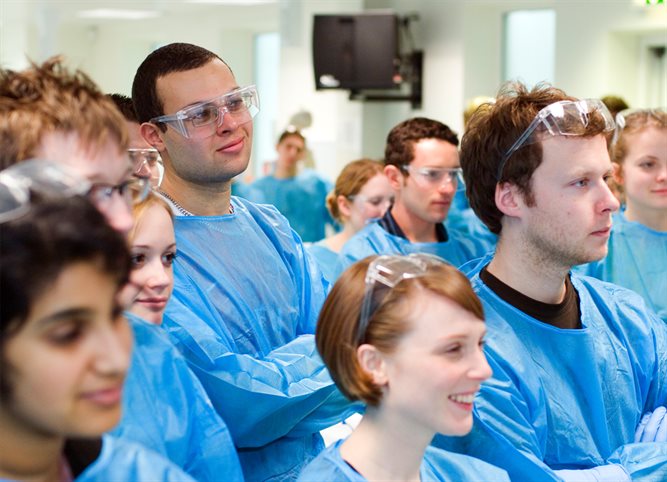Years 3 – 4
The academic year
The teaching year is extended to around 40 weeks, with short breaks at Christmas and Easter and a longer break in the summer.
Year 3
Year 3 starts with a two-week course introducing you to clinical medicine as it is practised in secondary care.
At the heart of Year 3 are ward-based attachments including:
- General Medicine, Acute Medicine and Cardiology
- Elderly Medicine and Psychiatry
- Surgery, including Perioperative Medicine, Emergency Medicine, Orthopaedics and Urology
In Year 3, you will consolidate your increasing clinical experience with an understanding of the underlying clinical, social science and public health issues through weekly teaching sessions in the Scientific Basis of Medicine module. This module also consolidates and expands your research skills in preparation for your Individual Research Project in Year 4.
You will learn about cutting-edge developments in areas such as genetics, immunology, infectious diseases and therapeutics and gain further experience in safe prescribing of drugs, an essential skill for your medical career. You will also continue the Time for Dementia programme and attend regular meetings with your tutor, which will support your personal and professional development via your e-portfolio.
Where will I study?
From Year 3, you will be based in hospitals across Sussex and Surrey. Much of the teaching takes place in Brighton at the Royal Sussex County Hospital and the Audrey Emerton Building (AEB), which provides comprehensive learning facilities, including a fully stocked medical library, computer suites, a clinical skills training area, teaching rooms for large and small group study and a top-floor restaurant with panoramic sea views. Most placements outside Brighton of four weeks or more are residential, to allow you to be fully immersed in the partner hospital team.

You will maintain an individual e-portfolio that is similar to the one you will use as a junior doctor, which help you reflect on how your personal strengths are developing along with your clinical skills and experience.
Intercalation
The intercalated degree is an optional addition to a medical degree. Subject to performance, you may have the opportunity to undertake an intercalated BSc or Masters degree, between Years 3 and 4.
Please note, intercalation numbers are capped at 40% of the total cohort, with priority given to those without a prior degree.
Read More about intercalation >
Year 4
During this year you will also undertake a rotation of clinical placements in the specialist subjects of
- General Practice
- ENT, Ophthalmology and Neurology
- Infectious Diseases, Microbiology and Sexual Health
- Rheumatology and Dermatology
- Oncology, Haematology and Palliative Care
- Obstetrics and Gynaecology
- Paediatrics
The clinical focus in Year 4 is on understanding how primary, community and secondary care structures work together to integrate care for the patient. You will also participate in Time for Autism and complete a year-long Individual Research Project, supervised by a university or hospital team.
“Now have a better understanding of autism as I had no experience before. Feel more comfortable talking to autistic patients.”
Find out more about Time for Autism >
Where will I study?
Students are likely to spend most of this year in Brighton but with periods of between one to five weeks at our partner hospitals across West and East Sussex.